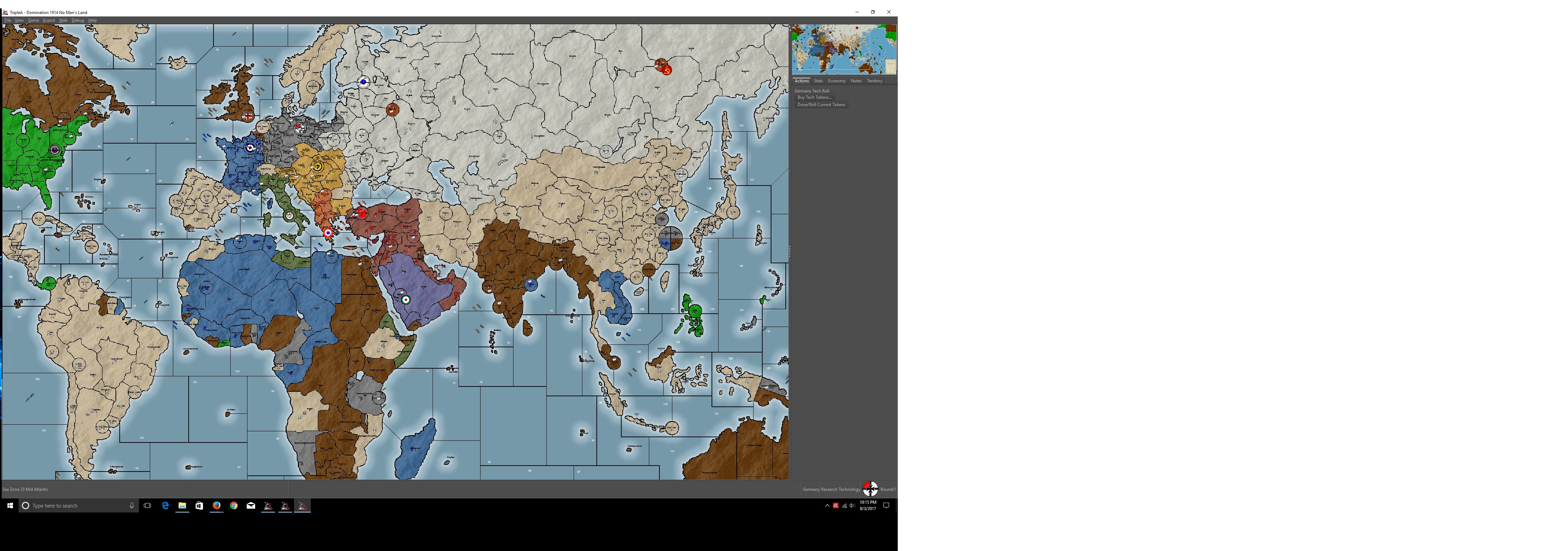Thanks, IL, for the heads-up. I might sell, might not.
Attached is a picture of my favorite online map, Domination 1914 No Man’s Land. The picture shows you almost all the map, except for half the Pacific. While I’ve gotten plenty of enjoyment out of Larry Harris’s maps over the years, I like this map even more. They added some new units.
Trench: costs 3, takes 2 hits to kill, defends on a 0. You don’t need a factory to place trenches. Nor do trenches count against the unit placement limits of territories with factories. Instead you can place up to 3 trenches per territory per turn. Use: cannon fodder.
Heavy gun: costs 5, attacks on a 2, provides artillery support when attacking. Defends on a 4. Gives you more defensive firepower for the money than any other unit, including infantry. Use: defensive firepower.
Cavalry: costs 4, attacks and defends on a 1, moves on a 2. Can receive artillery support. Use: a substitute for infantry, when you need more mobility.
Poison gas: costs 4, attacks on a 4, cannot be used on defense. Movement of 3. Pre-battle kamikaze attack. Units killed by gas don’t get casualty shots. Trenches cannot be taken as casualties against poison gas attacks. Use: if you need an offensive unit that’s more mobile than cavalry. Also useful if you have multiple nations attacking the same territory. Gas allows the first attacker to get a decent exchange, even if the attacker’s force is much smaller and weaker than the defender’s. Also, gas is useful if you notice the defender has too many trenches, not enough defensive firepower. Gas will make that situation even worse–for the defender, that is.
There are some familiar units:
Infantry: cost 3, attacks on a 1, defends on a 2. Can receive artillery support when attacking.
Field gun. These are the artillery you know and love. (Heavy guns are also considered artillery, which is why this unit has been renamed field gun.) Attacks and defends on a 2, costs 4, provides artillery support when attacking.
Fighter: cost 9, movement 3, attacks on a 2, defends on a 3, provides artillery support when attacking. (Okay, so maybe this isn’t 100% familiar because its stats are a bit different.)
Domination 1914 No Man’s Land’s tech system is very very good. The best I’ve ever seen in any map. Tech allows you to reduce some of your units’ costs, to obtain free units, income, and a free tech token each turn, to improve the offensive firepower of your field guns and the defensive firepower of your heavy guns. Not to mention improving the performance of your ships. Tech also allows you to construct new unit types: the tank, the late fighter, and the aircraft carrier.
In looking at the picture of the map, Germany is grey, France blue, Serbia orange, Austria yellow, Italy green, Arabia light purple, Turkey red, UK brown, Nationalist Russia white, communist Russia/USSR dark red, and the USA a different shade of green than Italy’s. Neutrals are an off-white, and can be farmed. There are no diplomatic consequences whatsoever to invading neutrals.








